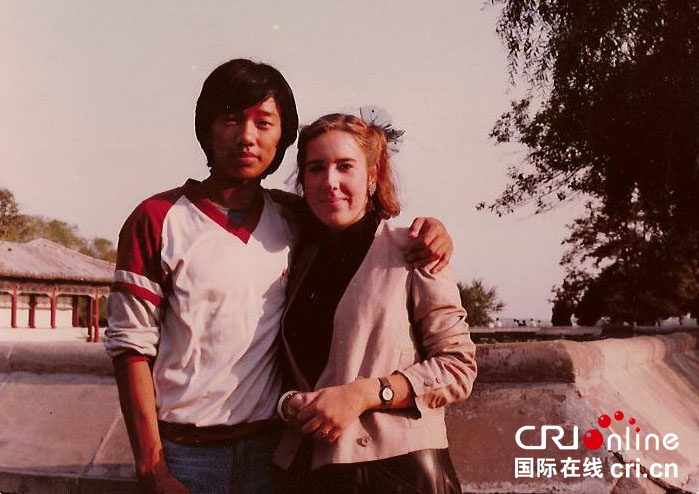
The young Inma and her husband Liu Xiaosong
Inma has seen the changes in Beijing overa space of over thirty years, from a closed offcountry to an open one, from one where thelocals are wary of foreigners, to one where theywelcome them, and from a relaxed life, to a fastpaced one. Although she knows the city likethe back of her hand, she still finds it hard tothink of a way to describe this city, her secondhome. After thinking for a while and mumblingin Chinese and Spanish she finally thinks of aword, “Honest!”
The first time Inma Gonzalez Puy cameto China was in 1979 and she studied at BeijingLanguage Institute (now Beijing Languageand Culture University). In 1983, she beganworking for the Cultural Section of the Spanish Embassy in China and even worked as culture attache for a period of time. She now serves asthe Director of Beijing’s Cervantes Institute.From foreign student to institute director, it’sbeen an unusual journey for her.
An Academic Life of a Foreign Student in Beijing
Inma was born in Barcelona, Spain. Her interest in Asian culture, particularly in Chineseculture, began when she was still at school. Shelearned Kungfu from local overseas Chinese,and practiced her Chinese when she visited theChinese restaurants.
In 1979, China decided to accept Spanish students, which is definitely a good news. As ahuge fan of China, Inma didn’t hesitate to apply for Beijing Language Institute and began her journey to Beijing.
Beijing was not as open as today and thelocals were very wary of foreigners, especially westerners. So it’s easy to imagine that Inma’slife wasn’t so smooth.
“I was living with a Mexican, who also spoke Spanish, which I didn’t really like. I’dcome all this way to learn Chinese, but my roommate was also a foreigner…” When remembering her first arrival in Beijing in the1970’s, Inma has a series of complex emotions across her face.
Inma’s Beijing dialect is already amazing.If you don’t look at her face and merely listen,you’d probably mistake her for a local. When she wants to express something special, she would think for a while and maybe mutters something in Spanish, but she can always findthe perfect one at last.
When she studied at the Beijing Language Institute, the foreign student dorms wereseparated from the rest. They even had aseparated canteen where the workers hardlyspoke to them. Sometimes a few brave Chinesestudents would wander over to talk to them, butstill in English. This disappointed her as shewas eager to integrate into the Chinese culture.
She says the worst thing happened whenshe went to meet a relative of her Chineseteacher in Spain in Wangfujing once. She saysthey were just walking down the street whenall of a sudden he vanished. She later found outthat he had been arrested and interrogated about why he was walking with a foreigner. Looking back on it all now she still feels sad: “I was solonely at the time. I was starting to questionwhether or not I should stay. I just hoped thingswould change, and they did, very quickly.”
The change she’s talking about is China’sreform and opening up policy. As the bridgeheadof the changes, Beijing was showing Inma andher friends its new look moment by moment.From 1979 to 1981, Inma came to China tostudy Chinese during summer vacation for threeyears. Each time Beijing was like a completely different city. When she graduated fromuniversity in Spanish in 1981, she immediately applied for a job in the Spanish Embassy. She said she wanted “to gain a new identity, and continue living in China.”





